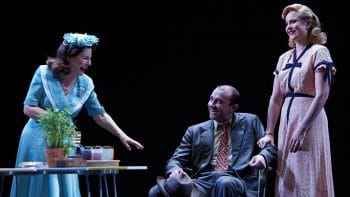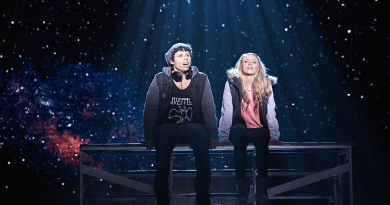Sydney Theatre Company’s All My Sons
Sydney Theatre Company’s new production of Arthur Miller’s All My Sons delves into a family ruined by the second world war, struggling to hold on to each other as they’re torn apart by grief – some of it of their own making. It exposes the experience of men coming back from war to a society that prospered financially from their sacrifice, held together by lies and driven by capital greed. Its message is still deeply relevant to us today.

Miller’s play holds a fragile family at its core, one who seem together and ideal to all those around them – and even themselves. But this family is grieving a son who went missing in war over three years ago, trying to counsel a mother who won’t (and maybe should) let go, and dealing with the consequences of mistakes buried in the past that are coming back to the surface to tear this family apart. Miller, with Williams’ perceptive and harrowing direction, probes at the ties that hold families together and explores the consequences of these bonds coming apart.
John Howard gives a heartbreaking performance of Joe Keller a pragmatic father trying to provide for his family and keep them together despite their losses. His relationship with his son Chris (a charming Chris Ryan) gives a touching insight into the powerful bond between father and son. Ryan’s Chris is sensitive, haunted by survivor’s guilt and struggling to forgive his parents’ misgivings and live in a world driven by economic pragmatism rather than the ideals he fought for at war. Robyn Nevin as Kate, a broken mother clinging on to hope to keep her family together, is compelling in all her subtleties and deep vulnerabilities.

Eryn Jean Norvill delivers a stirring performance as the bright eyed Ann who is only just hiding her desperate desire for companionship and happiness. Josh McConville as George, Ann’s brother, gives a tender portrayal of a desperate man realising the gravitas of his own mistakes and fighting to make them right. The neighbours, a stern Anita Hegh, an idealistic Bert LaBonte, a bubbly Contessa Treffone, a comedic John Leary, and an animated Jack Ruwald, round out this excellent cast.
Alice Babidge’s minimalistic set, coupled with Nick Schlieper’s lighting, makes the stage feel bare and almost artificial, grounding us in a ‘performance’ based reality where truth is what’s been constructed. It has hints of an inviting family home, but offset by its grandeur and starkness, there is always something slightly off in the house, as there is in the family. The unnerving sound design by Max Lyandvert reiterates this sentiment.
The final act of this play strips away the lies that have been keeping this family clinging to hope. Every actor’s revelations and realisations are haunting to watch. Every element works to strip away the artificial to get to the core of this family; even the set design brings this reality to the forefront by finally changing the family house’s facade. In the final scene, Chris is overcome as he realises he has become ‘practical’, he has succumb to the societal way and forfeited all he learnt at war for favour of practicality, and this ruins him. And it begs the question, what drives our society and how can we be better?
Miller’s insightful work and Williams’ moving direction, along with this affecting cast, confront us with the shape of our own lives. It raises questions about what drives our society, what we have built our foundations on. In an individualistic, capitalist society, who must suffer for our privileges? In a climate of increasing cuts to the federal aid budget, a society that largely rejects asylum seekers, and a world marked by vast inequalities, it is all too distressingly clear to see the effects of a pragmatic, economy focused society. This play sheds light on the tension between idealism and individualism, and asks us to consider the morality, truth and collective responsibility that hold our society together.




